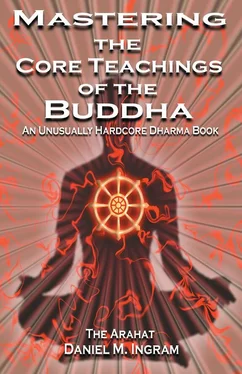Daniel Ingram - Mastering the Core Teachings of Buddha - An Unusually Hardcore Dharma Book
Здесь есть возможность читать онлайн «Daniel Ingram - Mastering the Core Teachings of Buddha - An Unusually Hardcore Dharma Book» весь текст электронной книги совершенно бесплатно (целиком полную версию без сокращений). В некоторых случаях можно слушать аудио, скачать через торрент в формате fb2 и присутствует краткое содержание. Год выпуска: 2009, ISBN: 2009, Издательство: Aeon Books, Жанр: Старинная литература, на русском языке. Описание произведения, (предисловие) а так же отзывы посетителей доступны на портале библиотеки ЛибКат.
- Название:Mastering the Core Teachings of Buddha - An Unusually Hardcore Dharma Book
- Автор:
- Издательство:Aeon Books
- Жанр:
- Год:2009
- ISBN:9781904658405
- Рейтинг книги:5 / 5. Голосов: 1
-
Избранное:Добавить в избранное
- Отзывы:
-
Ваша оценка:
- 100
- 1
- 2
- 3
- 4
- 5
Mastering the Core Teachings of Buddha - An Unusually Hardcore Dharma Book: краткое содержание, описание и аннотация
Предлагаем к чтению аннотацию, описание, краткое содержание или предисловие (зависит от того, что написал сам автор книги «Mastering the Core Teachings of Buddha - An Unusually Hardcore Dharma Book»). Если вы не нашли необходимую информацию о книге — напишите в комментариях, мы постараемся отыскать её.
Mastering the Core Teachings of Buddha - An Unusually Hardcore Dharma Book — читать онлайн бесплатно полную книгу (весь текст) целиком
Ниже представлен текст книги, разбитый по страницам. Система сохранения места последней прочитанной страницы, позволяет с удобством читать онлайн бесплатно книгу «Mastering the Core Teachings of Buddha - An Unusually Hardcore Dharma Book», без необходимости каждый раз заново искать на чём Вы остановились. Поставьте закладку, и сможете в любой момент перейти на страницу, на которой закончили чтение.
Интервал:
Закладка:
More than this, I try to perceive exactly and precisely when each sensation of motion or physicality of the breath arises and passes. I then do the same for the out-breath, paying particular attention to the exact end of the out-breath and then the beginning of the new in-breath. I don’t worry about how I am breathing because it is not the quality of the breath which I am concerned with or even what the sensations are, but the ultimate nature of these sensations: their impermanence, their arising and passing away. When I am really engaged with bending the mind to this exercise, there is little room to be lost in thought. I have found this to be a very useful practice for developing concentration and penetrating the illusion of continuity.
In the last exercise, I take on the thoughts directly. I know that the sensations that make up thoughts can reveal the truth of the Three Characteristics to me, so I have no fear of them; instead I regard them as more glorious opportunities for insight. Again, sitting quietly in a 23
The Three Characteristics
quiet place with my eyes closed, I turn the mind to the thought stream.
However, rather than paying attention to the content like I usually do, I pay attention to the ultimate nature of the numerous sensations that make up thoughts: impermanence. I may even make the thoughts in my head more and more intense just to get a good look at them.
It is absolutely essential to try to figure out how you experience thoughts, otherwise you will simply flounder in content. What do thoughts feel like? Where to they occur? How big are they? What do they look like, smell like, taste like, sound like? How long do they last?
Where are their edges? Only take on this practice if you are willing to try to work on this level, the level that tries to figure out what thoughts actually are rather than what they mean or imply.
If my thoughts are somewhat auditory, I begin by trying to perceive each syllable of the current thought and then each syllable’s beginning and ending. If they are somewhat visual, I try to perceive every instant in which a mental image presents itself. If they seem somewhat physical, such as the memory of a movement or feeling, I try to perceive exactly how long each little sensation of this memory lasts. This sort of investigation can actually be fairly easy to do and yet is quite powerful.
Things can also get a bit odd quickly when doing this sort of practice, but I don’t worry about that. Sometimes thoughts can begin to sound like the auditory strobing section of the song “Crimson and Clover,”
where it sounds like they are standing at a spinning microphone.
Sometimes the images in our head can begin to flash and flicker.
Sometimes our very sense of attention can begin to strobe. This is the point! The sensations that imply a mind and mental processes are discontinuous, impermanent.
Again, this practice requires steadiness and determination, as well as precision. When I am really engaged with this, there is no time to be lost in the content of the thoughts, as I am trying too hard to be clear about the beginning and ending of each little flicker, squawk and pulse which makes up thought. This can be an especially fun practice when difficult thoughts are distracting me from a physical sensation. I can turn on them, break them down into meaningless little blips, little vibrations of suchness, and then they don’t have the power to cause me any trouble. They just scatter like confetti. They are seen as they are: small, 24
The Three Characteristics
quick and harmless. They have a message to convey, but then they are gone.
When I am done with this exercise, I return to physical objects and their arising and passing. However, I have found taking on the sensations that make up thoughts to be another very useful exercise for developing concentration and penetrating the illusion of continuity. It doesn’t matter if they are “good thoughts” or “bad thoughts,” as all mental sensations are also dripping with ultimate truth that is just waiting to be discovered, and thus I can proceed in my investigation with confidence regardless of what arises. Whether our illusions are penetrated using physical sensations or mental sensations is actually completely irrelevant.
Hopefully these exercises will give you some idea about how one might practice understanding impermanence. Impermanence is a true mark of ultimate reality, so just understanding this again and again can be sufficient to drum it into our thick heads, debunk the illusion of continuity, and once this is drummed into our thick heads we are free.
This can be a subtle business, so be patient and persevere. Remember all three trainings. Following flickering sensations and understanding the other two characteristics of suffering and no-self that they manifest can be a powerful and direct cause for deep insights and awakenings.
For five years of my practice I was basically a One Technique Freak, and that technique was noticing how sensations flicker. I would do it as often as I could, i.e. basically whenever I didn’t have to be doing something that required concentration on the specifics of my life. I would be riding an elevator, just trying to see when I could feel each foot, or lying down to sleep and noticing how many times I could experience the sensations of my breath in each second. I also tried to notice this aspect of things for every single sensation that occurred during my formal practice. I used lots of objects, usually those that were presenting strongly at that time, and would use some variations on the above techniques as well as some others that I will mention shortly to keep me from getting stuck, but the aspect of my world that I tried to notice, things flickering, was always the same. I found that by making this sort of commitment to understanding one of the most basic 25
The Three Characteristics
assumptions of insight practices I was able to make fast progress and gain the ultimate insights I was looking for.
SUFFERING
The next characteristic is suff ering or un satisfactori nes s.
Sounds grim or pessimistic at first, and perhaps deservedly so in one sense, but it is also a powerful statement that our moment-to-moment experience will not permanently satisfy ever. It will never happen. Why?
Because everything is impermanent, that's one reason why! I just said that nothing lasts, meaning that you can actually experience everything that you normally think of as a solid world arising and passing instant to instant. So what could last for even the blink of an eye to satisfy?
Nothing!
The point is not to be a radical, pessimistic, nihilistic cynic. The point is that it is not a thing that will help, but an understanding of something in the relationship to things. There is no thought, mind state or whatever which will do it. This is not to say that conventional day-today wisdom, such as taking care of ourselves and others, isn't also quite important: it very much is. Remember that awakening is not a thing or a mind state or a thought, it is an understanding of perspective without some separate thing that perceives.
There is a great relieving honesty in the truth of suffering. It can be very validating of the actual experience of our life and also give us the strength to look into the aspects of life that we typically try to ignore and run from. Even some deep and useful insights can be distinctly unpleasant, contrary to popular belief!
There is more to this truth, and it relates to the third characteristic, no-self. We are caught up in this bizarre habit of assuming that there is an “I.” Yet the definition of this seemingly permanent thing has to keep constantly changing to keep up the illusion in an impermanent world.
This takes up a lot of mental time and is continually frustrating to the mind, as it takes so much constant work and effort. This process is called ignorance, i.e. the illusion of an “I” and thus that everything else is “not I.”
Читать дальшеИнтервал:
Закладка:
Похожие книги на «Mastering the Core Teachings of Buddha - An Unusually Hardcore Dharma Book»
Представляем Вашему вниманию похожие книги на «Mastering the Core Teachings of Buddha - An Unusually Hardcore Dharma Book» списком для выбора. Мы отобрали схожую по названию и смыслу литературу в надежде предоставить читателям больше вариантов отыскать новые, интересные, ещё непрочитанные произведения.
Обсуждение, отзывы о книге «Mastering the Core Teachings of Buddha - An Unusually Hardcore Dharma Book» и просто собственные мнения читателей. Оставьте ваши комментарии, напишите, что Вы думаете о произведении, его смысле или главных героях. Укажите что конкретно понравилось, а что нет, и почему Вы так считаете.












